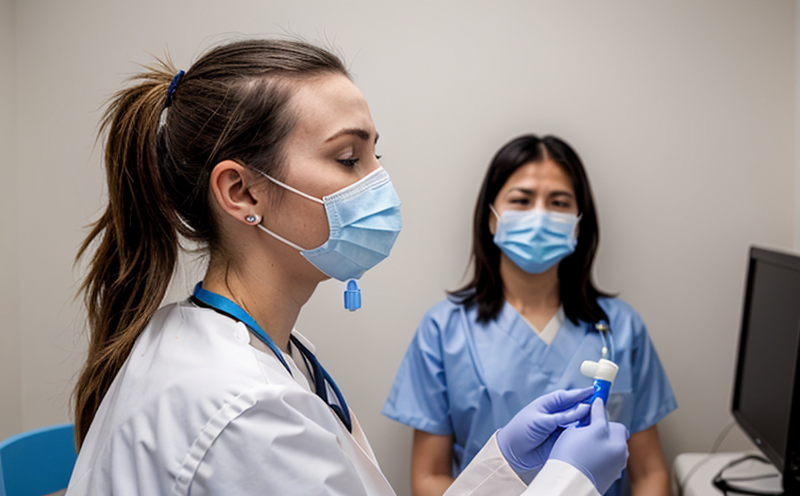Swine Influenza Virus Testing in Pigs
The swine influenza virus (SIV), also known as Swine flu, is a highly contagious viral infection that primarily affects pigs. It can cause respiratory problems and other health issues in pig populations, leading to significant economic losses for the agricultural sector. Accurate diagnosis of SIV is crucial for effective management strategies such as isolation, quarantine, and vaccination programs.
Our laboratory offers comprehensive testing services for detecting SIV in pigs using advanced molecular diagnostic techniques including reverse transcription polymerase chain reaction (RT-PCR). This method allows for precise identification of viral RNA within samples collected from affected animals. Proper sample collection is critical; it should include nasal swabs or throat washes which are processed promptly to ensure accurate results.
The process begins with detailed sampling protocols followed by extraction of nucleic acids from the virus particles present in these specimens. Subsequently, RT-PCR reactions are performed under controlled conditions where specific primers designed against known regions of the influenza genome amplify any viral sequences detected. The amplified products undergo further analysis using agarose gel electrophoresis or real-time qPCR platforms to confirm positivity.
Results from our SIV tests provide valuable information regarding disease presence within herds, enabling timely interventions aimed at preventing spread among susceptible populations. Timely diagnosis also supports biosecurity measures designed to protect against zoonotic transmission risks associated with this pathogen.
In addition to routine diagnostic testing, our laboratory can perform research-oriented studies investigating new strains or mutations of SIV affecting swine herds. This expertise ensures that we stay at the forefront of understanding emerging threats posed by this virus and contribute towards developing novel prevention methods.
Our commitment lies in providing reliable test results backed by robust quality assurance processes ensuring accuracy, reliability, and consistency across all our services. By leveraging cutting-edge technology combined with experienced personnel, we aim to support stakeholders involved in safeguarding public health as well as animal welfare through informed decision-making based on accurate diagnostic outcomes.
Applied Standards
The testing procedures employed by our laboratory adhere strictly to international standards such as ISO 15189 and EN ISO/IEC 17025, which govern the quality management systems of medical laboratories. These certifications ensure that our methods meet stringent requirements for accuracy, precision, reproducibility, and traceability.
For SIV testing specifically, we follow guidelines outlined in WHO recommendations and guidance documents published by OIE (World Organization for Animal Health), ensuring alignment with global best practices. Compliance with these standards guarantees consistency between our results and those generated elsewhere globally.
Scope and Methodology
The scope of our SIV testing service includes both routine diagnostic assessments as well as specialized research projects focused on identifying new variants or understanding the impact of specific interventions. Our methodology involves several key steps:
- Sample Collection: Nasal swabs or throat washes are collected from suspected cases and transported to our laboratory under optimal conditions.
- Nucleic Acid Extraction: Viral RNA is extracted using established protocols ensuring minimal degradation during extraction processes.
- Reverse Transcription Polymerase Chain Reaction (RT-PCR): Extracted nucleic acids are subjected to RT-PCR amplification targeting conserved regions of the influenza virus genome.
- Analytical Procedures: Amplified products undergo further analysis via agarose gel electrophoresis or real-time qPCR platforms for confirmation.
- Data Interpretation: Positive samples are reported along with their respective viral loads, while negative results indicate the absence of SIV in tested pigs.
This rigorous approach ensures reliable detection and quantification capabilities necessary for effective herd management practices. Additionally, our team provides interpretation support to help customers understand implications derived from test outcomes.
Industry Applications
- Animal Husbandry: Monitoring SIV activity helps farmers implement targeted biosecurity measures reducing risks of outbreaks affecting large numbers of livestock.
- R&D Institutions: Our research capabilities enable academic and commercial entities to explore novel approaches for controlling or eliminating this virus from swine populations.
- Regulatory Bodies: Compliance agencies rely on our accurate testing services when conducting inspections related to SIV prevalence within regulated sectors.
- Veterinary Clinics: Rapid diagnosis supports veterinarians in providing prompt treatment plans for infected animals, improving overall animal health outcomes.
Our expertise spans multiple aspects of swine influenza virus management supporting diverse stakeholders across various agricultural and healthcare settings.





